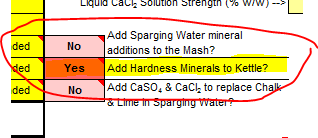aussie brewer
Well-Known Member
- Joined
- Mar 29, 2019
- Messages
- 155
- Reaction score
- 29
is there a way to do this on bru n water? im brewing yoopers stout from ro water, will adding calcium chloride ,and gypsum to the sparge or kettle reduce the amount of pickling lime needed to reach a ph of 5.5 to 5.6? my graing are already mixed so I cant steep the roast malts.
cheers
cheers






















































![Craft A Brew - Safale S-04 Dry Yeast - Fermentis - English Ale Dry Yeast - For English and American Ales and Hard Apple Ciders - Ingredients for Home Brewing - Beer Making Supplies - [1 Pack]](https://m.media-amazon.com/images/I/41fVGNh6JfL._SL500_.jpg)




